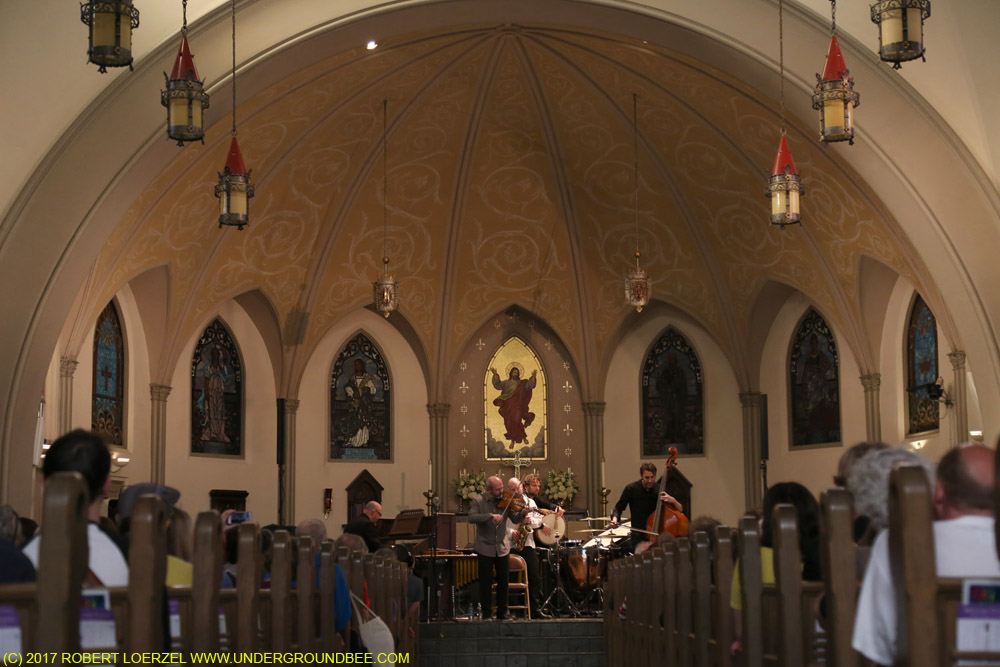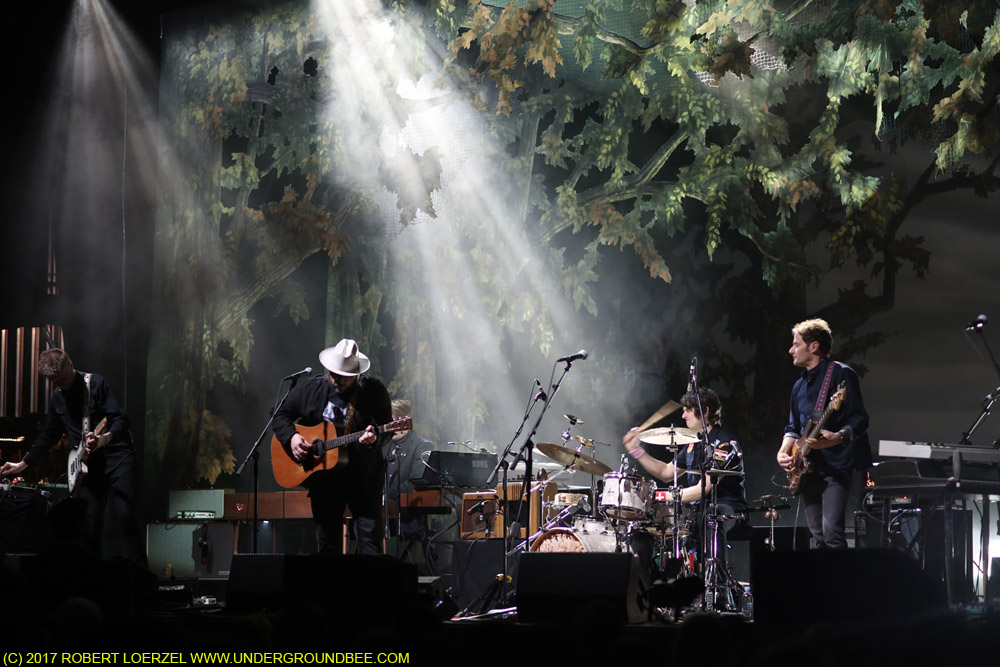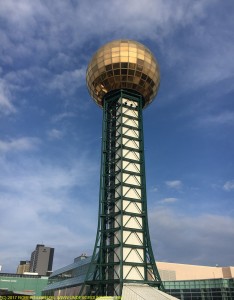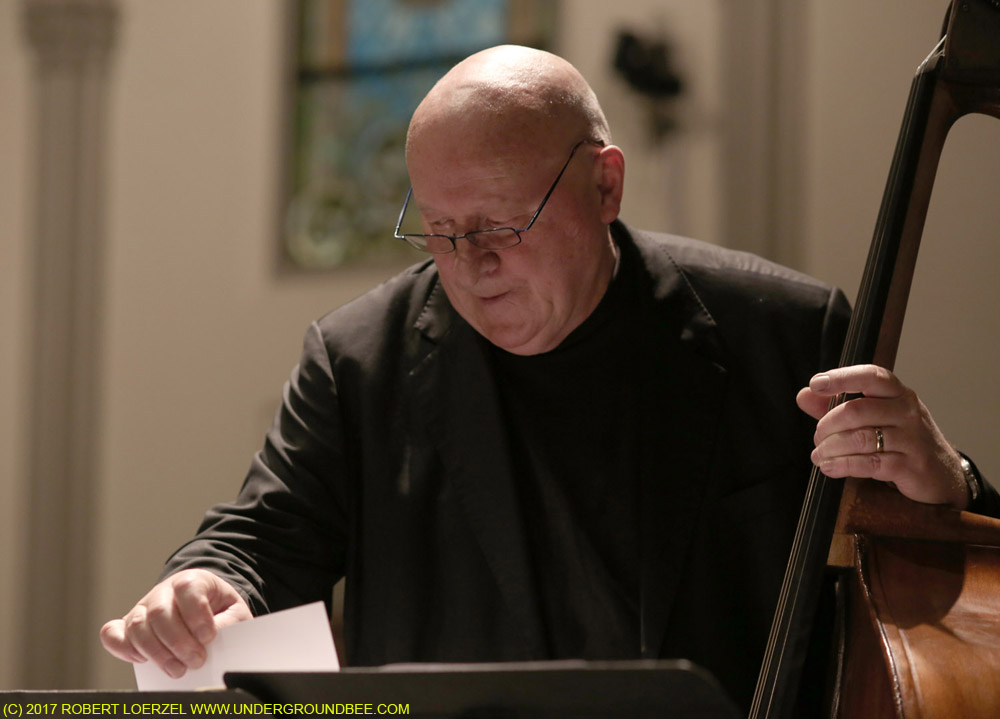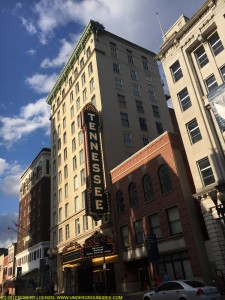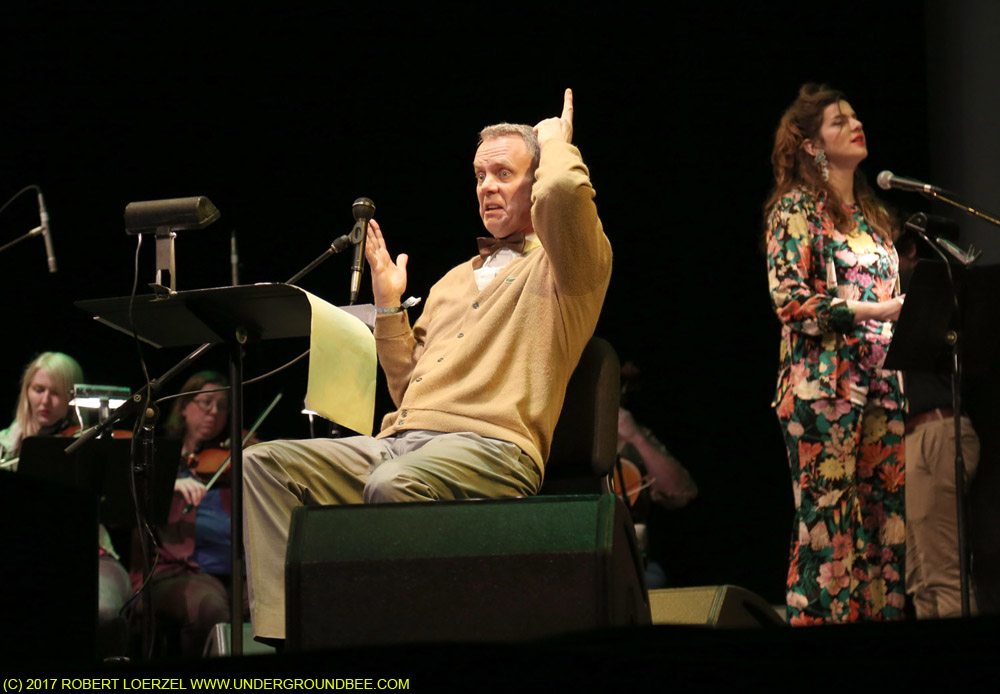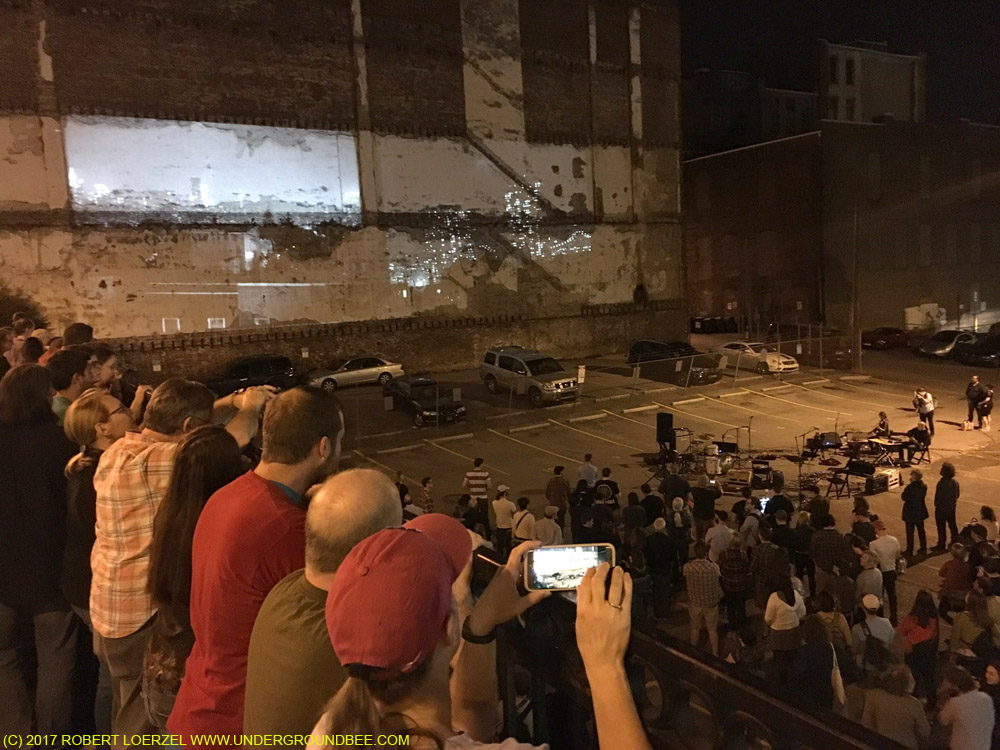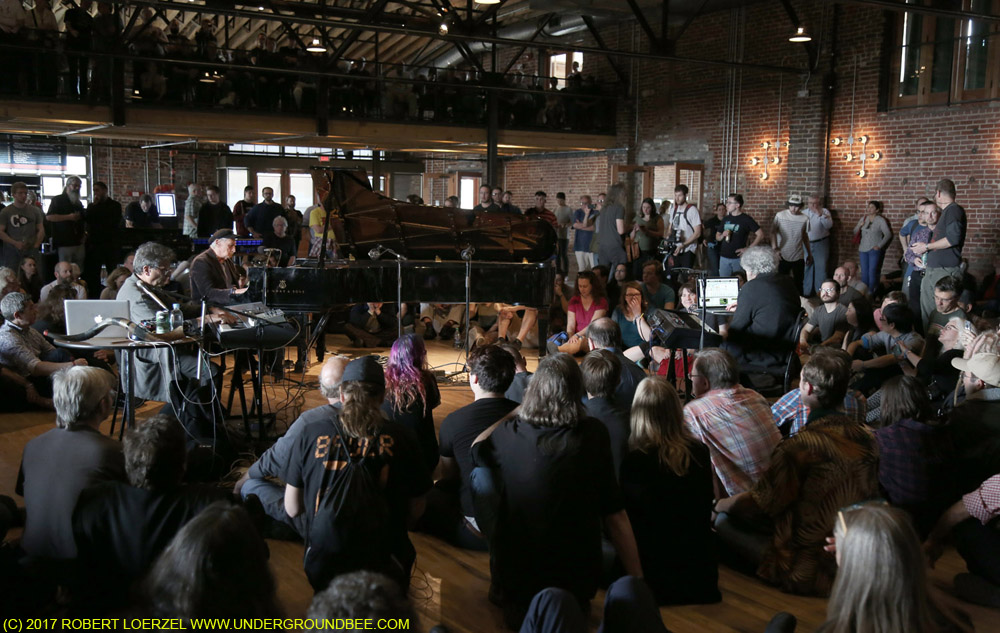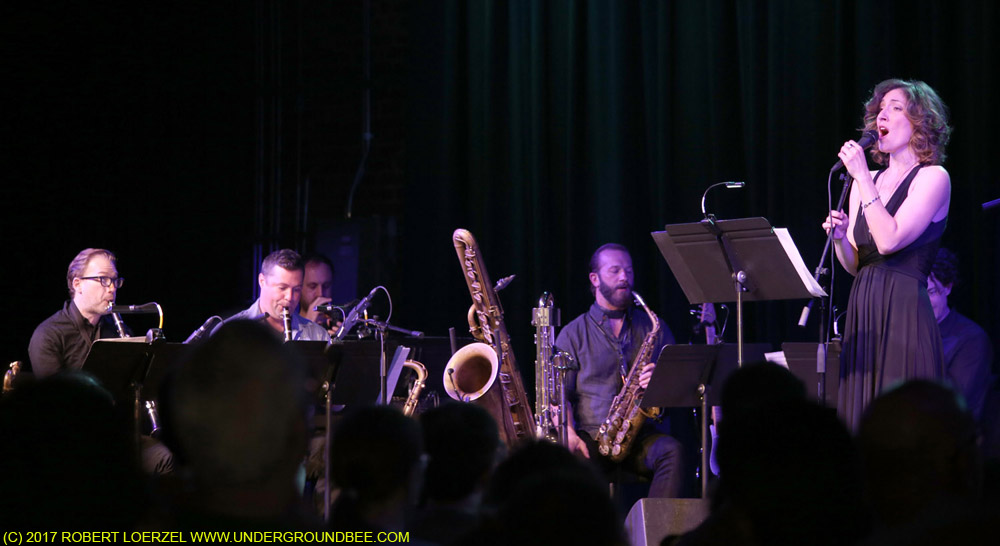(Links to Big Ears Festival photo galleries)
The Norwegian composer and violinist Nils Økland summed up the spirit of the Big Ears Festival when he spoke to the big crowd applauding his music at St. John’s Episcopal Cathedral in Knoxville, Tennessee. “You come here to hear things you don’t know — alien things — from places you don’t know, by people whose language you do not know,” said Økland, who was playing in the United States for the first time ever. He seemed to marvel at the rapturous reception he was getting.
Every pew was filled for that concert on March 24, as afternoon sunlight streamed in through the big stained-glass windows. People stood along the walls and sat on the floor against the back wall so they could hear Økland and his band. His gorgeous music glowed, all of the instruments combining into an organic whole. There was something transcendent about it, and the church felt like a perfect setting for Økland’s American debut.
This is the sort of moment that makes Big Ears so special. The annual festival in downtown Knoxville features indie rock music — this year’s acts included Wilco and the Magnetic Fields — but the diverse lineup runs the gamut from folk and jazz to classical and experimental music. The emphasis is on adventurous music. I attended the first Big Ears Festival back in 2009 and I’ve been wanting to return ever since; I finally made it back to Knoxville this past week. My experience reaffirmed Big Ears’ standing as one of the most interesting and enjoyable music festivals.
This year’s festival was four days, with concerts at nightclubs, theaters and churches spread out across downtown Knoxville (a city known for hosting the 1982 World’s Fair). While some of the venues fill up for certain shows, it’s a fairly mellow event as far as the audience goes. It’s easy to walk between the venues, and you aren’t likely to get shut out of too many concerts.
Many of the artists performing at Big Ears do more than one show, playing in various combinations. Wilco’s concert on Friday, March 24, at the grandiose Tennessee Theatre was an outstanding example of this Chicago rock band’s virtuosic performances, but it was just the start of several Wilco-related events. I also caught part of Jeff Tweedy’s set with Chikamorachi (bassist Darin Gray and drummer Chris Corsano), where he improvised loud, atonal noise on electric guitar; drummer Glenn Kotche’s fun set as part of the On Fillmore duo with Gray; and guitarist Nels Cline’s guest appearance with Dustan Louque. (See my photos of Wilco and Wilco’s side projects at Big Ears.)
After seeing that wonderful performance by Nils Økland and his band at St. John’s, I made sure to see one of several other shows he performed. The one that I saw, at a nightclub called the Standard, featured Økland in duets with fellow Norwegian composer Mats Eilertsen on bass. (See my photos of Nils Økland at Big Ears.)
Another star attraction at this year’s Big Ears was the English minimalist composer Gavin Bryars, whose ensemble was playing in the U.S. for the first time. I saw part of the ensemble’s concert on Saturday, March 25, at St. John’s Cathedral and two full concerts on Sunday, March 26, featuring Bryars’ most famous works: Jesus’ Blood Never Failed Me Yet and The Sinking of the Titanic.
Bryars played upright bass as he conducted the musicians with a few subtle gestures. Jesus’ Blood Never Failed Me Yet is a piece that has haunted me for years, built around a loop of tape Bryars recorded in 1971, of an old Englishman singing the religious song “Jesus’ Blood Never Failed Me Yet.”
Bryars and his ensemble — supplemented by members of the Knoxville Symphony Orchestra — remained still and silent for several minutes on the stage at the Mill and Mine nightclub as the tape loop began playing. Then they slowly began adding orchestral accompaniment to the anonymous man’s sorrowful lament, playing with intense precision. Through sheer repetition, the music disoriented. At the same time, it felt majestic. (What happened to that man on the tape recording? Bryars writes: “Although he died before he could hear what I had done with his singing, the piece remains as an eloquent, but understated testimony to his spirit and optimism.”)
Later that night, the Bryars Ensemble concluded the festival at the Tennessee Theatre with a performance of The Sinking of the Titanic, featuring a historic film about the ship’s fateful voyage projected on the screen behind the orchestra. The pictures in the film were doubled, with a mirror image on one side, as the ensemble played another cycling Bryars composition, with a soundtrack of crackles, voices and maritime noises mixed into the music. (See my photos of the Gavin Bryars Ensemble at Big Ears.)
In addition to Wilco, highlights of the rock music at Big Ears included Xiu Xiu devoting an entire concert at the Tennessee Theatre to Angelo Badalamenti’s music of David Lynch’s Twin Peaks TV series.
My Brightest Diamond’s Shara Nova (formerly named Shara Worden) returned to her rock-trio roots during her set, while Blonde Redhead played its 2004 album Misery Is a Butterfly with accompaniment by the American Contemporary Music Ensemble.
Scottish composer Anna Meredith’s band played an invigorating set that combined classical minimalism with rock.
Chicago’s Tortoise delivered a strong set of its instrumentals.
And Robyn Hitchcock was as great as usual, opening his set with covers of the music that influenced him as a young songwriter (Bob Dylan, the Beatles and Syd Barrett).
Singer-songwriter Joan Shelley sounded as beautiful as ever, previewing some of the music from her forthcoming album.
After years of making instrumental records, Colleen (aka French musician Cécile Schott) sang delightful songs, playing the viola de gamba, melodica and keyboards.
Gyan Riley’s solo acoustic guitar performance was stunning.
And the Swedish musician Emilia Amper’s performance on the nyckelharpa — including an explanation of this bowed instrument with keys — was throughly enchanting.
The experimental electronic music duo Matmos covered the 1979 Robert Ashley album, Perfect Lives (Private Parts), which is described as an opera, with assistance from several musicians and singers. With a fractured narrative delivered as spoken word, it was a perfect fit for Matmos’ sense of humor and musical textures.
On the jazz side, I saw Carla Bley leading the Knoxville Jazz Orchestra, as well as sets by Henry Grimes and Pulitzer Prize-winning Chicago composer Henry Threadgill. It was fascinating to hear the instruments in their bands talking to one another.
The Scandinavian group Supersilent combined jazz elements with ambient noise for a powerful and dark late-night set on Saturday. Coming out of that show, I stopped into the Tennessee Theatre and watched about half an hour of the Coen brothers’ movie No Country For Old Men, with an improvised score by the Dave Harrington Group.
Another intriguing cinematic experience happened earlier that night, when films by Jem Cohen were projected onto the walls of a building in downtown Knoxville while musicians (including Xylouris White) improvised a score. The event, called “Gravity Hill Sound+Image,” attracted passers-by along with festival attendees.
The Mill and Mine, a venue in an industrial building with a wide open floor, proved to be a great place for classical music as well as rock shows. For several shows at this place, a Steinway piano or other instruments were placed in the middle of the floor, with audience members gathering around the artists. This was a great way to experience Bang on a Can All-Stars pianist Lisa Moore’s performances of works by Philip Glass, John Luther Adams and others.
And it was also the setting for a bracingly weird set of noise and piano by Musica Elettronica Viva, an avant-garde group that started back in 1966, featuring Alvin Curran, Frederic Rzweski and Richard Teitelbaum in this performance. And the Knoxville Symphony Orchestra also performed on the floor, giving listeners and opportunity to circle around and see the tympani and cellos from an unusual perspective.
Other noteworthy classical performances at Big Ears included Icelandic composer Jóhann Jóhannsson’s Drone Mass, performed by the American Contemporary Music Ensemble and Theatre of Voices, conducted by Donato Cabrera; the radical vocal experiments of Meredith Monk; and dynamic performances by cellists Oliver Coates and Maya Beiser.
And there was even audience participation. On Sunday, people pulled out some Tennessee stones from a bin and knocked them together in their hands, following the guidance of the late Pauline Oliveros to create a performance she titled “Rock Piece.”
A highlight for me was Sorrow, Colin Stetson’s “reimagining” of Henryk Górecki’s 3rd Symphony — essentially, a new arrangement of that symphony, which became a million-selling hit (and a personal favorite of mine) in 1992. Stetson is a wizard on alto and bass saxophones and contrabass clarinet, so naturally, his version of Górecki’s composition uses more woodwinds than the original. It also has electric guitar and drums. But while the textures are different, it doesn’t wander too far from the original symphony. Stetson’s sister, mezzo-soprano Megan Stetson, sang the Polish-language lyrics of Górecki’s “Symphony of Sorrowful Songs.” Stetson’s Sorrow was stirring to see and hear in a live performance.
As with any festival, Big Ears presented many conflicting musical choices. At many times, there were two or three performances I wanted to see happening simultaneously. (I missed all but a few minutes of Magnetic Fields’ two-part concert, knowing that I will see them soon in Chicago.) But Big Ears was as fulfilling of a festival experience as I’ve had, and the performers seemed to be genuine whenever they expressed their own appreciation of Big Ears. As Lisa Moore commented during her piano recital, musing on the Big Ears name: “It’s not just that the music has wide possibilities. It’s the audience.”
Big Ears Festival photo galleries:
Photos of Wilco (plus Jeff Tweedy with Chikamorachi, On Fillmore and Dustan Louque with Nels Cline)

